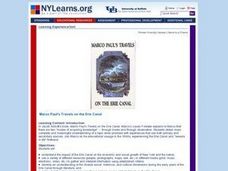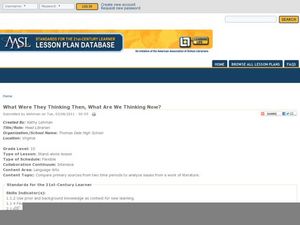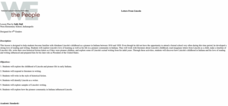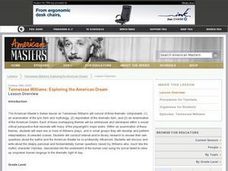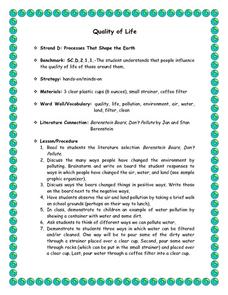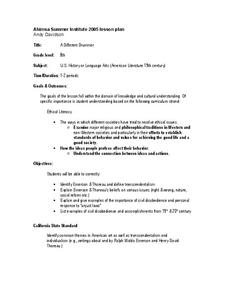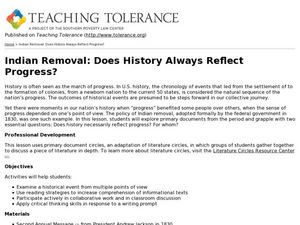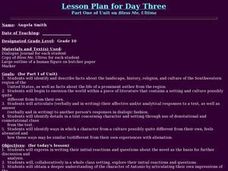Curated OER
Marco Paul's Travels on the Erie Canal
Students conduct research in order to create an understanding of The Eerie Canal and its place in history and the world. students use a variety of primary and secondary resources to aid in the research process.
Curated OER
What Were They Thinking Then, What Are We Thinking Now?
Choosing an issue from a play or novel, researchers find two primary sources from different time periods to compare how people's views have changed. Many questions are listed to guide young writers. In the end, learners produce a...
Curated OER
Snowy Evening Poetry for ESL (Elementary, Literature)
Learners read Robert Frost's Stopping by the Woods on a Snowy Evening, illustrated by Susan Jeffers (2001). This is a wonderful book with beautiful illustrations that go with each line of the poem.
Curated OER
Story Elements
Students create a "character T-shirt" that exemplifies their ability to analyze a character. The students also compare and contrast characters in a given story. Finally, the students write a presentation about the story's characters,...
Curated OER
Introduction to "Julius Caesar"
Students discuss American form of government. They read the play Julius Caesar.
Curated OER
America's Civil Rights Movement, Activity Seven
Students model the writing style of the author of a piece of literature and present them to the class.
Curated OER
Letters from Lincoln
Fourth graders explore the childhood of Lincoln and pioneer life in early Indiana. Students respond to literature and write a story using historical fiction. Students explore the writings of President Lincoln and the pioneer community...
Curated OER
Tennessee Williams: Exploring the American Dream
Students read and analyze selections of Tennessee Williams' work. They write journal responses, conduct Internet research, perform various scenes from one of Williams' dramas, and create a presentation.
Curated OER
Quality of Life
Students discover that people influence the quality of life of those around them. They read the literature selection 'Berenstein Bears, Don't Pollute' and discuss the many ways people have changed the environment by polluting.
Curated OER
Argumentation and Logic
Students recognize inductive and deductive reasoning and analyze common fallacies in critical thinking. In this argumentation and logic lesson, students use role playing activities and specific instances of inductive and deductive...
Curated OER
Push or Pull
Students discover that one way to change how something is moving is to give it a push or a pull. They design their own boats and work with 'The Great Boat Push' worksheet to compare how their boats move when they are pushed or pulled and...
Curated OER
When My Name Was Keoko
Learners construct a book banquet to help us to recall and enjoy food eaten in Korea during the 1940's. The class is to read When My Name Was Keoko and then create a book banquet that the students invite their parents to. Learners cook...
Curated OER
Holocaust Theme
Students complete a unit of lessons on the events of the Holocaust during WWII. They write daily journal entries, create a collage, view and discuss videos, read and analyze novels and poetry, and complete a novel project.
Curated OER
Faces of the community (the): Art from the Heart
Students understand the selflessness of the artists Gauguin and Van Gogh. In this art lesson, students produce art work that reflects the diversity in the their school community. Students share their artwork to explain how they show...
Curated OER
A Different Drummer
Eighth graders investigate philosophy and meditation techniques by discussing Emerson and Thoreau. In this philosophical traditions lesson, 8th graders identify the men Ralph Waldo Emerson and Henry David Thoreau, their work, and...
Curated OER
The Environment and You
First graders examine the human environmental impact and discover ways to lessen effects. They create a pollution damage flow chart and write down what they think Mother Earth might say. They create inventions from recyclable materials.
Curated OER
The Clock Tower on Grand Avenue: A Cultural Reading Adventure
Sixth graders read three novels to practice their reading and comprehension skills. Using each novel, they create a list of the characteristics of each culture represented. In groups, they also identify the setting, characters and plot...
Curated OER
Folk Genres
Students classify folk life traditions into folk genres. They create folk genre museums by laying down their images or postcards wherever they see a relationship. They give each an image to examine in depth and decide which folk genre...
Curated OER
Indian Removal: Does History Always Reflect progress?
Students explore the idea that progress for some might not mean progress for all. In this Native American lesson, students recognize different viewpoints about historical events through the study of primary documents. Students decipher...
Orange County Department of Education
Black Cowboy, Wild Horses
Fifth graders read the selection Black Cowboy, Wild Horses and identify characteristics of self-discipline shown by story's main character, Bob Lemmons. Students then identify some of their own traits of self-discipline and reflect upon...
Curated OER
Bless Me, Ultima: Dialogue Journals
Tenth graders read Chapter 1 of the novel "Bless Me, Ultima" and respond to the text. They answer and ask questions and record their impressions of different aspects of the book in a dialogue journal format with a partner. Students...
Curated OER
Geo Jammin'-Day2, Lesson 7: Roll, Roll, Unroll the Scroll
Second graders write in journals, recording personal thoughts about what they learned and/or something they are wondering about.
Curated OER
Post Reading Activities for the Novel, "Home Children" by Barbara Haworth-Attard
In this post-reading literature activity worksheet, students examine suggestions for activities to complete after reading Home Children, by Barbara Haworth-Attard. They can choose from 11 activities which include to write diary entries,...
Curated OER
Georgia Performance Standards Framework for ELA Unit 6-8th grade
Eighth graders explore figurative language through the study of picture books. In this figurative language lesson plan, 8th graders listen to books and chart the figurative language that they hear. Students discuss examples in groups.
